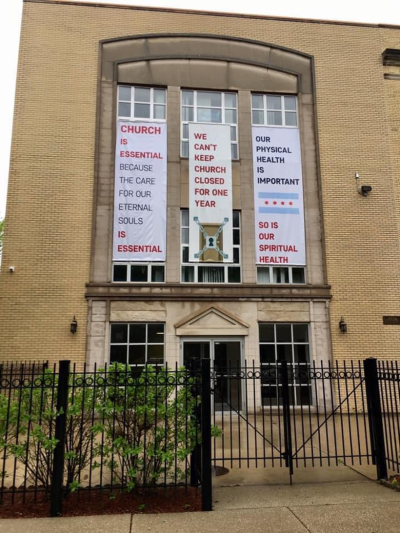Court rejects churches’ lawsuit against Ill. worship restrictions

An appeals court panel has ruled against a lawsuit brought by two Illinois churches seeking relief from state-level measures that limit the numbers of attendees for in-person worship gatherings.
Elim Romanian Pentecostal Church and Logos Baptist Ministries filed lawsuit against Gov. Jay Pritzker over the restrictions that limited in-person gatherings to no more than 10 people.
Although the state recently eased its restrictions on in-person worship gatherings, the case was not considered moot because the governor could restore the attendance limit at any time if he sees fit to do so.
On May 28, Pritzker eased restrictions on in-person worship services, recommending that gatherings be limited to 25% capacity or a 100-person maximum.
A three-judge panel of the U.S. Court of Appeals for the Seventh Circuit ruled earlier this week that Illinois was right to limit in-person worship to no more than 10 people.
Judge Frank Easterbrook wrote the opinion, arguing that the executive order capping in-person attendance does not single out religious gatherings, as argued by the churches.
“The vital question therefore is whether Executive Order 2020-32 discriminates against religion. Funerals, weddings, and similar activities are subject to the same size limit that applies to worship services,” wrote Easterbrook.
“Illinois did not set out to disadvantage religious services compared with secular events. Nor does the order discriminate among faiths.”
Easterbrook also reasoned that if anything, the order discriminated in favor of religion, as secular activities such as movie theaters and concert venues were shut down.
“While all theaters and concert halls in Illinois have been closed since mid-March, sanctuaries and other houses of worship were open, though to smaller gatherings,” he continued.
“And under Executive Order 2020-38 all arrangements for worship are permitted while schools, theaters, and auditoriums remain closed.”
Although the vast majority of churches in the U.S. closed down in response to the coronavirus, some congregations continued to hold in-person worship services.
Churches like Elim Romanian argued that shutting down or greatly limiting their in-person worship was a violation of their First Amendment rights.
They further argued that while violating the 10-person limit, they still enacted safety measures such as wearing face masks and spacing out attendees at their services.





















